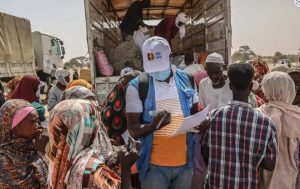Sudan refugee crisis deepens
More than four million people have fled Sudan since the beginning of a civil war there in 2023, the UN refugee agency UNHCR has reported.
Many survivors now face inadequate shelter due to funding shortages, UNHCR says.
“Now in its third year, the four million people is a devastating milestone in what is the world’s most damaging displacement crisis at the moment,” the agency said in a statement.
“If the conflict continues, we expect thousands more people will continue to flee, putting regional and global stability at stake,” the statement said.
 Sudan, which saw a civil war break out in April 2023, shares borders with Chad, Egypt, South Sudan, Eritrea, Ethiopia, Central African Republic and Libya.
Sudan, which saw a civil war break out in April 2023, shares borders with Chad, Egypt, South Sudan, Eritrea, Ethiopia, Central African Republic and Libya.
More than 800,000 of the refugees have arrived in Chad, where they are living dire circumstances because of funding shortages, with only 14 per cent of the UNHCR’s funding needs met.
“This is an unprecedented crisis that we are facing. This is a crisis of humanity. This is a crisis of protection based on the violence that refugees are reporting,” the statement said.
UNHCR has highlighted, particularly, concern over the deepening humanitarian emergency in eastern Chad, where the number of Sudanese refugees has more than tripled in just over two years of deadly conflict.
Since April 2023, more than 844,000 Sudanese refugees have crossed into Chad. Prior to this latest crisis, Chad was hosting approximately 409,000 Sudanese refugees who had fled earlier waves of conflict in Darfur between 2003 and 2023.
In just over two years, the country has seen this refugee population surge to over 1.2 million people, far exceeding the number received during the previous two decades and placing unsustainable pressure on Chad’s ability to respond.
The most recent influx to Chad began in late April 2025, following violent attacks by armed groups in North Darfur in early April.
Assaults on displacement camps, including Zamzam and Abu Shouk, and El Fasher town killed more than 300 civilians and sent tens of thousands in search of safety.
In just over a month, 68,556 refugees have arrived in Chad’s Wadi Fira and Ennedi Est provinces, with an average of 1,400 people crossing the border daily in recent days. These civilians are fleeing in terror, many under fire, navigating armed checkpoints, extortion, and tight restrictions imposed by armed groups.
A UNHCR survey of newly arrived refugees found harrowing accounts of violence and loss, with 72 per cent reporting serious human rights violations, including physical and sexual violence, arbitrary detention, and forced recruitment.
Sixty per cent said they had been separated from family members.
As well as a displacement emergency, there is a devastating children’s crisis unfolding.
Among school-aged children, 66 per cent are currently out of education, and 30 children have arrived with serious injuries.
UNHCR says there is an urgent need to expand health-care provision and mental health support to address immediate suffering and lay the groundwork for recovery and reconciliation.
“Despite the efforts of humanitarian partners and local authorities, the emergency response remains dangerously underfunded. Shelter conditions are equally dire. Only 14 per cent of current needs are being met, leaving tens of thousands exposed to extreme weather and insecurity,” the statement said.
“Refugees currently receive only 5 litres of water per person per day, well below the international standard of 15 to 20 litres for basic daily needs.
“This severe shortage forces families to make impossible choices that put their health and dignity at risk. Additionally, around 290,000 refugees remain stranded at the border, exposed to the elements, insecurity and the risk of further violence.”
As part of the Sudan Regional Refugee Response, UNHCR and partners in Chad are urgently seeking $553.7 million to respond to the life-saving needs of refugees fleeing Sudan into eastern Chad, including protection, shelter, food, water and sanitation.












